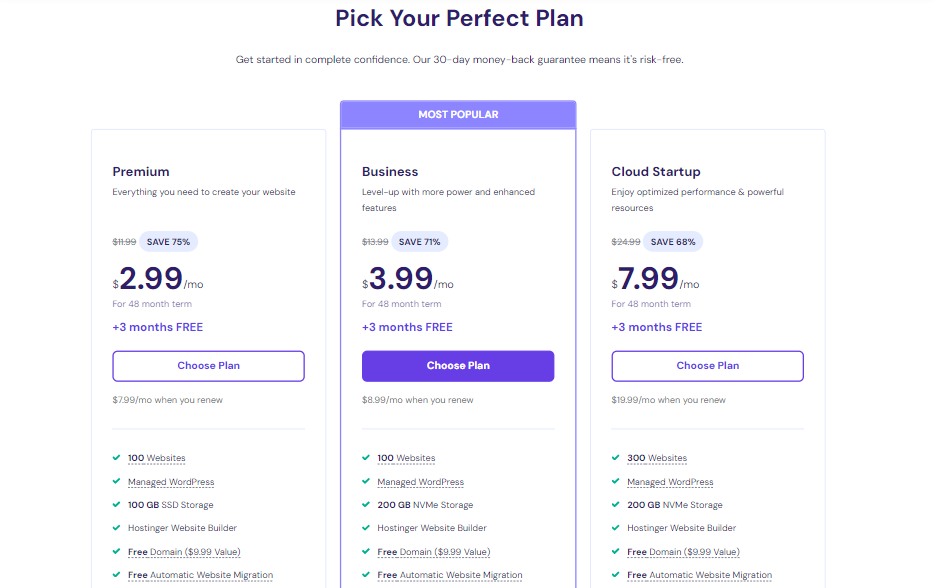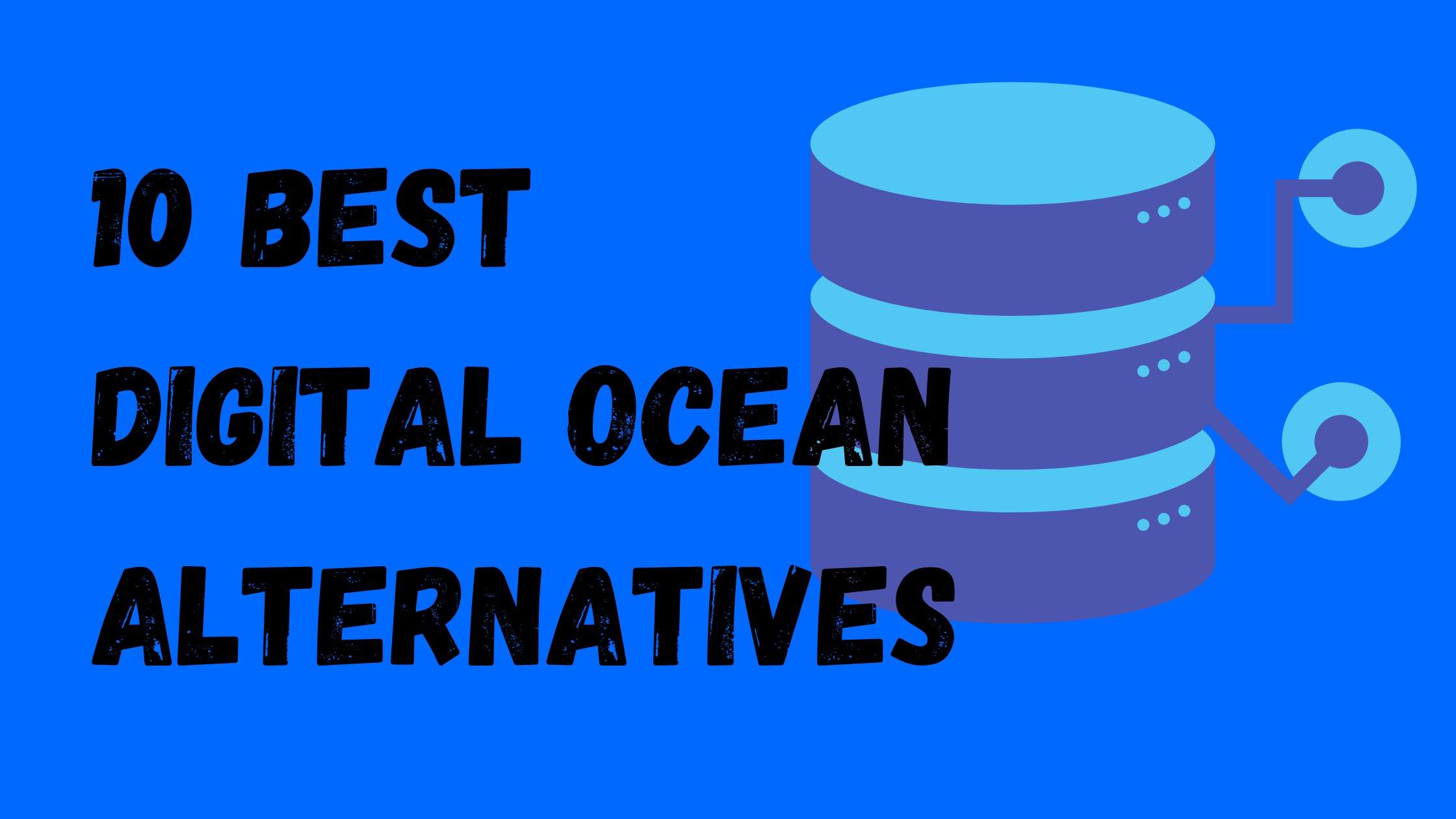DigitalOcean is a popular choice for cloud hosting, offering reliable and scalable solutions for developers. However, it may not be the perfect fit for everyone due to its pricing, features, or support offerings. If you’re looking for some DigitalOcean alternatives, here’s a comprehensive comparison of ten other providers that can meet your cloud hosting needs.
1. Vultr

Overview: Vultr offers high-performance SSD cloud servers with flexible pricing and a focus on simplicity.
Key Features:
- Custom ISO support
- Multiple operating system choices
- Hourly and monthly billing
Pros:
- Easy to deploy
- Competitive pricing
- High performance
Cons:
- Limited additional services
- Support could be improved
Pricing:
- Plans start at $2.50 per month for 512MB RAM.
- Hourly billing available.
2. Hostinger

Overview: Hostinger provides affordable cloud hosting with an emphasis on ease of use and customer support.
Key Features:
- Intuitive control panel
- Free SSL and domain
- Managed WordPress hosting
Pros:
- Excellent value for money
- User-friendly interface
- Great customer support
- Additional 20% Discount through the link on this page
Cons:
- Limited advanced features
- Fewer global data centres
Pricing
- Shared hosting starts at $2.99/month (Premium).
- VPS hosting starts at $3.99/month.
3. Amazon Web Services (AWS)
Overview: AWS is a leader in the cloud industry, providing a wide range of services, including computing power, storage, and databases.
Key Features:
- Extensive service portfolio
- Pay-as-you-go pricing
- Global data centers
Pros:
- High scalability
- Robust security features
- Excellent support and documentation
Cons:
- Complex pricing structure
- Can be overwhelming for beginners
Pricing:
- EC2 instances start at $0.013 per hour.
- Pay-as-you-go with various pricing models based on service usage.
4. Google Cloud Platform (GCP)
Overview: Google Cloud offers a powerful infrastructure for building and hosting applications at scale.
Key Features:
- Integration with Google services
- Machine learning and AI capabilities
- Competitive pricing
Pros:
- Strong focus on innovation
- High availability and performance
- Flexible pricing models
Cons:
- Steep learning curve
- Less user-friendly for smaller businesses
Pricing:
- GCP offers a free tier with $300 credits for new users.
- Custom pricing based on resources and usage.
5. Microsoft Azure
Overview: Azure provides a range of cloud services, from computing and networking to analytics and AI.
Key Features:
- Hybrid cloud capabilities
- Integration with Microsoft products
- Comprehensive compliance coverage
Pros:
- Strong enterprise focus
- Wide range of services
- Reliable performance
Cons:
- Complicated pricing
- Can be costly for small projects
Pricing:
- B1s virtual machines start at $0.007 per hour.
- Pricing varies based on service selection and usage.
6. Linode
Overview: Linode is known for its affordable and simple cloud hosting solutions, ideal for developers.
Key Features:
- Easy-to-use interface
- Flat-rate pricing
- Global data centers
Pros:
- Cost-effective
- Excellent customer support
- Developer-friendly
Cons:
- Fewer services than larger providers
- Limited advanced features
Pricing:
- Plans start at $5 per month for 1GB RAM.
- Simple and transparent pricing structure.
7. IBM Cloud
Overview: IBM Cloud offers a range of cloud solutions, from computing and storage to AI and IoT.
Key Features:
- Hybrid and multicloud capabilities
- Strong security and compliance
- AI and machine learning services
Pros:
- Robust enterprise solutions
- High reliability
- Comprehensive service offerings
Cons:
- Complex pricing
- Not as user-friendly for small businesses
Pricing:
- Virtual servers start at $0.042 per hour.
- Pay-as-you-go and subscription options.
8. Alibaba Cloud
Overview: Alibaba Cloud is a leading provider in Asia, offering a wide range of cloud services globally.
Key Features:
- Strong global presence
- Big data and AI capabilities
- Cost-effective solutions
Pros:
- Competitive pricing
- High performance
- Rapid global expansion
Cons:
- Limited support in non-Asian regions
- Interface can be confusing
Pricing:
- ECS instances start at $0.0076 per hour.
- Pay-as-you-go and subscription models.
9. Oracle Cloud
Overview: Oracle Cloud provides a range of cloud solutions, with a focus on database and enterprise applications.
Key Features:
- Integration with Oracle products
- Autonomous database capabilities
- Comprehensive security
Pros:
- Strong focus on enterprise needs
- High performance
- Flexible pricing
Cons:
- Complex for beginners
- Less developer-focused
Pricing:
- Compute instances start at $0.0255 per hour.
- Flexible pricing models.
10. Heroku
Overview: Heroku is a platform as a service (PaaS) that simplifies the deployment of applications.
Key Features:
- Easy app deployment
- Add-ons for extended functionality
- Supports multiple programming languages
Pros:
- Extremely user-friendly
- Fast deployment process
- Good for small apps and startups
Cons:
- Can be expensive as you scale
- Limited control over infrastructure
Pricing:
- Free tier available with basic features.
- Paid plans start at $7 per month for dynos.
Comparison Table
Here’s a comparison table of DigitalOcean alternatives to help visualize the differences among these providers:
| Provider | Key Features | Starting Price | Ideal For |
|---|---|---|---|
| AWS | Extensive services, global reach | $0.013/hr | Large enterprises |
| Google Cloud | Integration, AI capabilities | $300 credits | Tech-savvy businesses |
| Microsoft Azure | Hybrid cloud, Microsoft integration | $0.007/hr | Enterprises and developers |
| Linode | Simple interface, flat-rate pricing | $5/month | Developers and small teams |
| Vultr | SSD servers, flexible pricing | $2.50/month | Developers and SMBs |
| Hostinger | Intuitive, managed WordPress | $2.99/month | Budget-conscious users |
| IBM Cloud | Hybrid, AI services | $0.042/hr | Enterprises and AI projects |
| Alibaba Cloud | Global presence, AI | $0.0076/hr | Asian markets and startups |
| Oracle Cloud | Database focus, security | $0.0255/hr | Enterprises and DBs |
| Heroku | Easy deployment, add-ons | $7/month | Startups and small apps |
Tips for Choosing the Right Provider
- Assess Your Needs: Consider what features and level of support you require.
- Budget Considerations: Choose a provider that fits your budget while meeting your needs.
- Ease of Use: Look for platforms with user-friendly interfaces if you’re not tech-savvy.
- Scalability: Ensure the provider can accommodate your growth plans.
Pros and Cons
| Hosting Provider | Pros | Cons |
|---|---|---|
| Vultr | – Simple, predictable pricing. – Wide range of locations globally. – Fast SSD storage and performance. | – Limited support options. – No managed hosting options. |
| Hostinger | – Very affordable plans. – Beginner-friendly interface. – Free domain and SSL with some plans. | – Limited scalability for large enterprises. – Basic customer support options in lower-tier plans. |
| Amazon Web Services (AWS) | – Enterprise-level infrastructure. – Highly scalable. – Wide range of cloud-based services. | – Complex pricing model. – Steep learning curve for beginners. |
| Google Cloud Platform (GCP) | – Global reach and performance. – Tight integration with Google services. – Excellent machine learning tools. | – Complicated pricing structure. – More suitable for advanced users or developers. |
| Microsoft Azure | – Robust for enterprise-level applications. – Seamless integration with Microsoft products. – Global presence. | – High pricing, especially for small businesses. – Can be complex to manage without technical expertise. |
| Linode | – Competitive pricing for VPS. – Developer-friendly. – Simple interface and strong community support. | – Fewer data centers compared to larger providers. – No managed hosting options. |
| IBM Cloud | – Strong focus on AI and machine learning. – Flexible pricing and offerings. – Enterprise-level features. | – Less user-friendly for beginners. – Fewer global data centers compared to AWS, Google Cloud, or Azure. |
| Alibaba Cloud | – Competitive pricing for Asian markets. – Strong presence in China and Asia. – Broad service offering. | – Limited global presence outside Asia. – Language and support barriers for non-Chinese users. |
| Oracle Cloud | – Excellent for databases and enterprise-level applications. – Strong security features. | – Less flexible for small businesses. – Higher pricing, more complex than basic hosting providers. |
| Heroku | – Extremely user-friendly, great for developers building apps. – Free tier available. | – More expensive as you scale. – Less control over infrastructure compared to VPS or dedicated hosting. |
Conclusion
Choosing the right cloud hosting provider depends on your specific needs and goals. While DigitalOcean remains a strong choice, these ten DigitalOcean alternatives offer unique features and pricing structures that might be better suited for your project. Whether you prioritize scalability, affordability, or specific features, there is a provider on this list to meet your requirements.


[…] You might also like to read “The 10 Best DigitalOcean Alternatives” […]
This post is exactly what I was looking for. You’ve addressed all the questions I had and provided clear, actionable advice.
Glad that this post helped.
Your writing style is engaging and informative. I’ve learned so much from this post and can’t wait to apply these tips to my own projects.
Go about it and let me know if you need any help.
Go about it and let me know if you need any help.